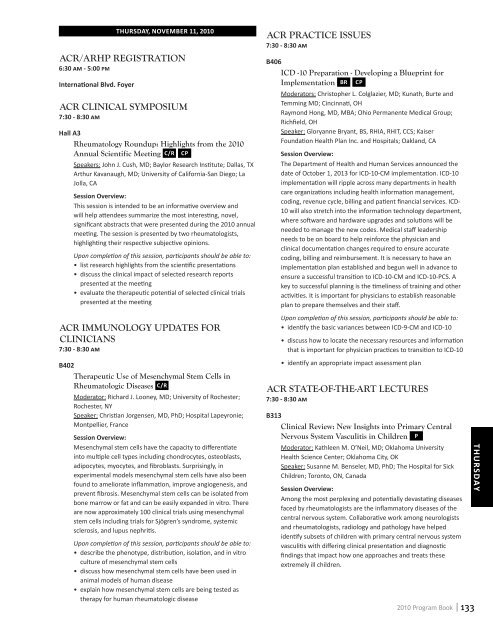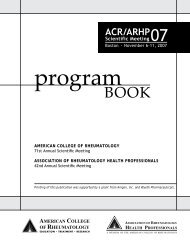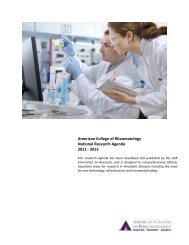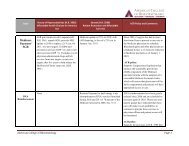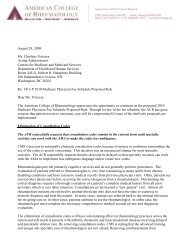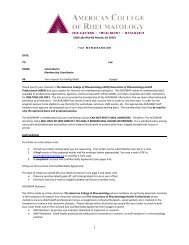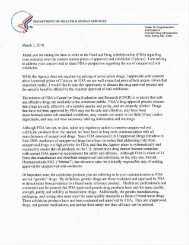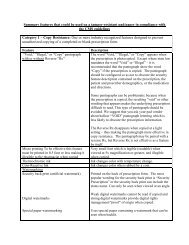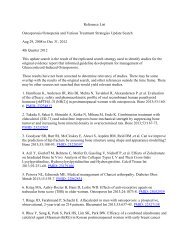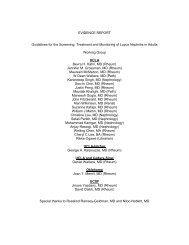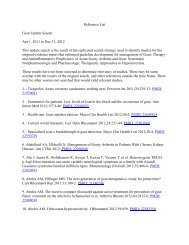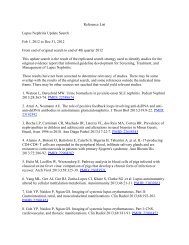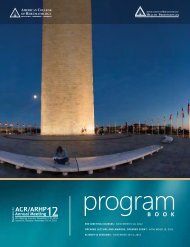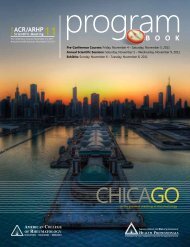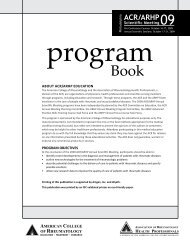B O O K - American College of Rheumatology
B O O K - American College of Rheumatology
B O O K - American College of Rheumatology
Create successful ePaper yourself
Turn your PDF publications into a flip-book with our unique Google optimized e-Paper software.
THURSDAY, NOVEMBER 11, 2010<br />
ACR/ARHP Registration<br />
6:30 am - 5:00 PM<br />
International Blvd. Foyer<br />
ACR Clinical Symposium<br />
7:30 - 8:30 am<br />
Hall A3<br />
<strong>Rheumatology</strong> Roundup: Highlights from the 2010<br />
Annual Scientific Meeting c/r cP<br />
Speakers: John J. Cush, MD; Baylor Research Institute; Dallas, TX<br />
Arthur Kavanaugh, MD; University <strong>of</strong> California-San Diego; La<br />
Jolla, CA<br />
Session Overview:<br />
This session is intended to be an informative overview and<br />
will help attendees summarize the most interesting, novel,<br />
significant abstracts that were presented during the 2010 annual<br />
meeting. The session is presented by two rheumatologists,<br />
highlighting their respective subjective opinions.<br />
Upon completion <strong>of</strong> this session, participants should be able to:<br />
• list research highlights from the scientific presentations<br />
• discuss the clinical impact <strong>of</strong> selected research reports<br />
presented at the meeting<br />
• evaluate the therapeutic potential <strong>of</strong> selected clinical trials<br />
presented at the meeting<br />
ACR Immunology Updates for<br />
Clinicians<br />
7:30 - 8:30 am<br />
B402<br />
Therapeutic Use <strong>of</strong> Mesenchymal Stem Cells in<br />
Rheumatologic Diseases c/r<br />
Moderator: Richard J. Looney, MD; University <strong>of</strong> Rochester;<br />
Rochester, NY<br />
Speaker: Christian Jorgensen, MD, PhD; Hospital Lapeyronie;<br />
Montpellier, France<br />
Session Overview:<br />
Mesenchymal stem cells have the capacity to differentiate<br />
into multiple cell types including chondrocytes, osteoblasts,<br />
adipocytes, myocytes, and fibroblasts. Surprisingly, in<br />
experimental models mesenchymal stem cells have also been<br />
found to ameliorate inflammation, improve angiogenesis, and<br />
prevent fibrosis. Mesenchymal stem cells can be isolated from<br />
bone marrow or fat and can be easily expanded in vitro. There<br />
are now approximately 100 clinical trials using mesenchymal<br />
stem cells including trials for Sjögren’s syndrome, systemic<br />
sclerosis, and lupus nephritis.<br />
Upon completion <strong>of</strong> this session, participants should be able to:<br />
• describe the phenotype, distribution, isolation, and in vitro<br />
culture <strong>of</strong> mesenchymal stem cells<br />
• discuss how mesenchymal stem cells have been used in<br />
animal models <strong>of</strong> human disease<br />
• explain how mesenchymal stem cells are being tested as<br />
therapy for human rheumatologic disease<br />
ACR Practice Issues<br />
7:30 - 8:30 am<br />
B406<br />
ICD -10 Preparation - Developing a Blueprint for<br />
Implementation BR cP<br />
Moderators: Christopher L. Colglazier, MD; Kunath, Burte and<br />
Temming MD; Cincinnati, OH<br />
Raymond Hong, MD, MBA; Ohio Permanente Medical Group;<br />
Richfield, OH<br />
Speaker: Gloryanne Bryant, BS, RHIA, RHIT, CCS; Kaiser<br />
Foundation Health Plan Inc. and Hospitals; Oakland, CA<br />
Session Overview:<br />
The Department <strong>of</strong> Health and Human Services announced the<br />
date <strong>of</strong> October 1, 2013 for ICD-10-CM implementation. ICD-10<br />
implementation will ripple across many departments in health<br />
care organizations including health information management,<br />
coding, revenue cycle, billing and patient financial services. ICD-<br />
10 will also stretch into the information technology department,<br />
where s<strong>of</strong>tware and hardware upgrades and solutions will be<br />
needed to manage the new codes. Medical staff leadership<br />
needs to be on board to help reinforce the physician and<br />
clinical documentation changes required to ensure accurate<br />
coding, billing and reimbursement. It is necessary to have an<br />
implementation plan established and begun well in advance to<br />
ensure a successful transition to ICD-10-CM and ICD-10-PCS. A<br />
key to successful planning is the timeliness <strong>of</strong> training and other<br />
activities. It is important for physicians to establish reasonable<br />
plan to prepare themselves and their staff.<br />
Upon completion <strong>of</strong> this session, participants should be able to:<br />
• identify the basic variances between ICD-9-CM and ICD-10<br />
• discuss how to locate the necessary resources and information<br />
that is important for physician practices to transition to ICD-10<br />
• identify an appropriate impact assessment plan<br />
ACR State-<strong>of</strong>-the-Art Lectures<br />
7:30 - 8:30 am<br />
B313<br />
Clinical Review: New Insights into Primary Central<br />
Nervous System Vasculitis in Children P<br />
Moderator: Kathleen M. O’Neil, MD; Oklahoma University<br />
Health Science Center; Oklahoma City, OK<br />
Speaker: Susanne M. Benseler, MD, PhD; The Hospital for Sick<br />
Children; Toronto, ON, Canada<br />
Session Overview:<br />
Among the most perplexing and potentially devastating diseases<br />
faced by rheumatologists are the inflammatory diseases <strong>of</strong> the<br />
central nervous system. Collaborative work among neurologists<br />
and rheumatologists, radiology and pathology have helped<br />
identify subsets <strong>of</strong> children with primary central nervous system<br />
vasculitis with differing clinical presentation and diagnostic<br />
findings that impact how one approaches and treats these<br />
extremely ill children.<br />
2010 Program Book 133<br />
thursday


